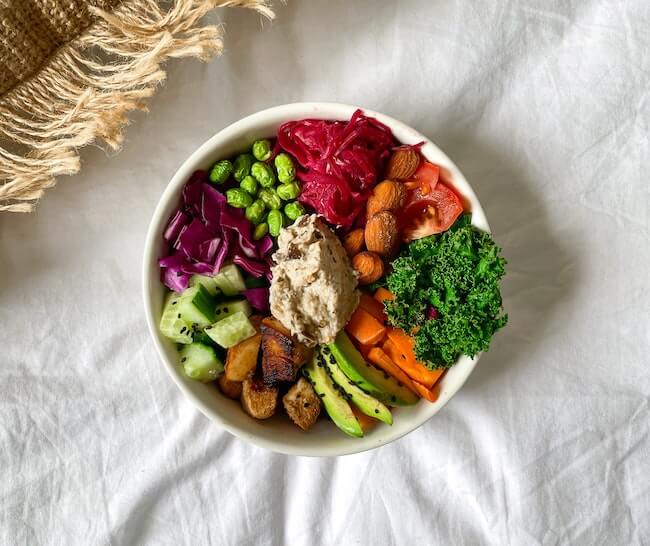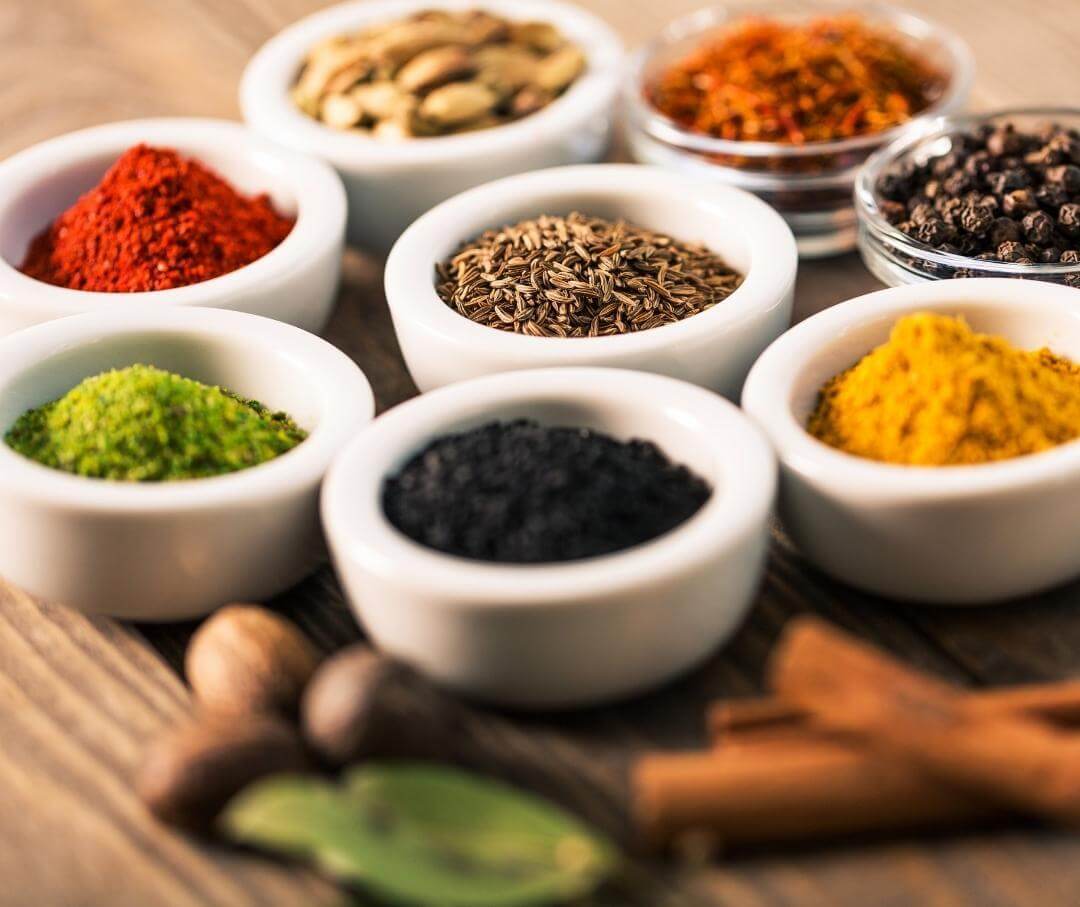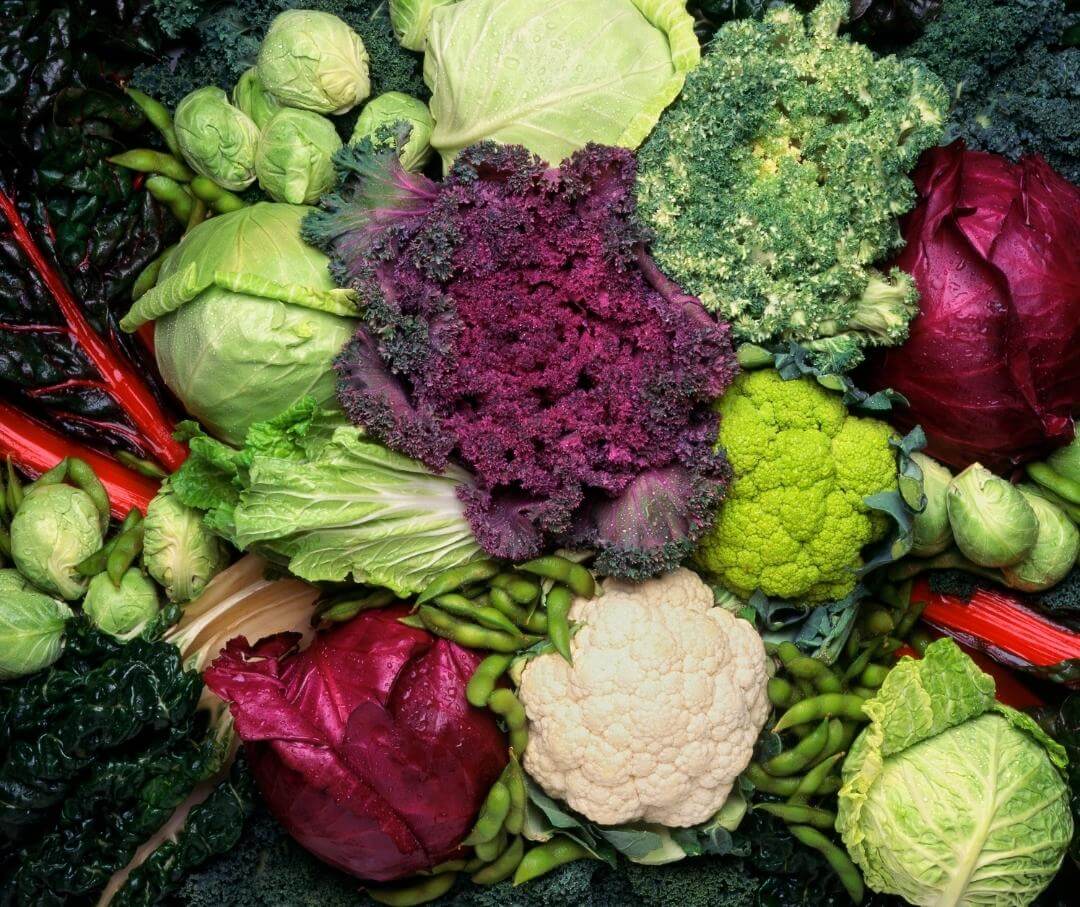Kiwi is a small and fuzzy fruit that packs a punch when it comes to nutrition and health benefits. Some benefits of eating kiwi include better digestion and heart health. Eating more kiwis can also increase your intake of antioxidant plant compounds.
{{mid-cta}}
What Is Kiwi?
Kiwi is also known as the Chinese gooseberry. It’s a small, fuzzy fruit with black seeds that originated in China but later found its way to New Zealand. China, New Zealand, and Italy are among the top producers of kiwi in the world, while California produces 98% of the kiwi grown in the United States.
This vibrant green gem has become a global sensation, finding its way into households around the world. While it's a native of China and found a second home in New Zealand, kiwi is now grown in various regions with favorable climates, including Italy, Chile, and the United States.1, 2
Known for its unique combination of sweet and slightly tart flavors, kiwi has become a fresh addition to fruit salads, smoothies, and desserts. Whether you're enjoying it on its own or getting creative by adding it to new dishes, kiwi adds flavor and nutrients to your plate.
Nutritional Profile of Kiwi
This small, unassuming fruit is considered a nutritional powerhouse because it’s bursting with essential vitamins, minerals, fiber, and plant compounds.
Kiwi is jampacked with vitamin C, often providing more of this immune-boosting vitamin than oranges. A single serving of kiwi provides the amount of vitamin C you need for the whole day, which is important for making collagen, skin health, and a robust immune system.
Kiwi is also a great source of vitamin K, which is essential for blood clotting and bone health. Last but not least, kiwi contains vitamin E, a potent antioxidant that protects your cells from oxidative stress.
Beyond vitamins, kiwi is rich in minerals and plant compounds, including carotenoids and polyphenols, known for their antioxidant properties. These phytonutrients play an important role in neutralizing harmful free radicals, supporting overall health, and reducing the risk of chronic diseases.
Nutritional Profile per Serving
Per 100 grams, kiwi typically contains:3
- Calories: 61
- Vitamin C: 92 mg (over 100% of the recommended daily intake)
- Vitamin K: 40.3 mcg
- Vitamin E: 1.46 mg
- Potassium: 312 mg
- Fiber: 3 gm
6 Health Benefits of Kiwi Fruit You Need to Know

Kiwis are a small but mighty treasure trove of health benefits when eaten as part of a balanced and nutritious diet. Here are some compelling reasons to make kiwi a regular addition to your meals:
1. Improves Digestive Health
Kiwi is rich in fiber, providing about 3 grams for every 100-gram serving. Along with probiotics, fiber is an important component of a healthy digestive system. Kiwi provides a combination of both soluble and insoluble fiber.
Soluble fiber adds bulk to stool, while insoluble fiber helps speed up the transit of food in the digestive tract and helps prevent constipation. Together, these fibers promote regular bowel movements, prevent constipation, and support overall gut health.4
2. Promotes Better Sleep
If you have difficulty falling asleep or staying asleep, kiwi might just be your new bedtime buddy. This fruit contains serotonin, a neurotransmitter that plays a role in sleep regulation. The antioxidants and flavonoids in kiwi may also help improve sleep quality, making it a natural remedy for those restless nights.5
One study showed that adults who ate two kiwis at least one hour before bedtime for six weeks had significantly improved sleep duration and sleep quality and fell asleep faster.6
3. Supports Normal Blood Clotting
Kiwi provides 23 to 30% of the daily vitamin K content. Vitamin K plays an important role in blood clotting. Normal blood clotting is needed for wound healing and allows your body to respond properly to injuries and maintain normal circulation and heart health.7
Vitamin K also plays an important role in bone health.
4. Supports Immune Function
Kiwi is an excellent source of bio-available vitamin C. Vitamin C plays many important roles in the body, including supporting the immune system, collagen synthesis, and skin health. Vitamin C is an antioxidant that protects the cells from free radicals and decreases inflammation.
Research shows that the high vitamin C content of kiwis can help you reach optimal blood levels of vitamin C. Regular consumption of kiwi can help ward off infections, reduce the duration of colds, and keep your immune defenses in top-notch condition.8
5. Promotes Digestive Health
The combination of fiber, prebiotics, and antioxidants in kiwi creates an ideal environment for a thriving gut microbiome.
As mentioned before, kiwi contains both soluble and insoluble fiber. The fiber found in kiwis is better at retaining water and swelling than other types of fibers, like apple fiber and wheat bran, which means it’s a good choice for improving stool consistency and lessening the time it takes for food to pass through your digestive system. This makes kiwi an excellent choice for people who struggle with constipation.9
A healthy gut is not only linked to digestive wellness but also plays a role in supporting a strong immune system and even mental health.
6. Supports Heart Health
Kiwi is low in saturated fat and high in heart-friendly nutrients like potassium. Together, this helps regulate blood pressure, reduce the risk of stroke, and support overall cardiovascular health. The high fiber content can help lower LDL cholesterol and increase HDL cholesterol. The antioxidants in kiwi also contribute to the prevention of oxidative stress, a commonly known factor in heart disease.
The Impact of Kiwi on Blood Sugar Levels
The nutritional profile of kiwis contributes to its positive impact on blood sugar levels. The fruit is rich in dietary fiber, particularly soluble fiber, which plays an important role in slowing down digestion and the release of sugar in the bloodstream. This gradual release helps prevent rapid spikes in blood sugar levels, providing a more stable and controlled response to sugar consumed from the fruit.
Kiwi also contains various bioactive compounds, including polyphenols and antioxidants, which have been linked to improved insulin sensitivity. These compounds may improve the way the body responds to and uses insulin, allowing for better glucose regulation.
One study found that individuals who ate kiwi regularly experienced lower post-meal glucose levels compared to those who did not include kiwi in their diet. This suggests that incorporating kiwi as part of a balanced meal may contribute to better blood sugar control.10
Kiwi includes essential vitamins and minerals, such as vitamin C, potassium, and folate. These nutrients contribute to overall health and may support metabolic functions related to blood sugar regulation.
Kiwi as a Low-Glycemic Fruit
The glycemic index measures how quickly a particular food raises blood sugar levels. Kiwi has a low to moderate glycemic index (GI) fruit. As the fruit ripens, the GI increases. With a low to moderate GI, kiwi is a good option if you’re trying to manage blood sugar, as it elicits a slower and more controlled increase in glucose.11
Adding kiwi to a balanced diet can be good for people with diabetes or those who are trying to prevent blood sugar fluctuations. Its fiber, antioxidants, and low glycemic index make kiwi a delicious and nutritious option for metabolic health.
<p class="pro-tip"><strong>Also Read: </strong><a href=fruits-vegetables-colors>How Eating the Rainbow Can Benefit Your Health + How to Do It</a>.</p>
Potential Side Effects of Kiwis
Although kiwi is generally safe for most individuals, some people may experience side effects, especially those with specific medical conditions or allergies.
Before adding more kiwi to the diet, people taking blood thinners or beta-blockers or those with kidney problems should talk to their healthcare provider. Kiwi may interact with certain medications, which might interfere with how the medication works.
Kiwi contains vitamin K, which can interfere with blood thinners. The potassium content in kiwi may negatively impact individuals who take beta-blockers or those with kidney problems, as excess potassium can be problematic for these conditions.
Potential Side Effects of Kiwi Consumption
While kiwi is generally safe for many people, some people might experience side effects, particularly those with kiwi allergies or sensitivities. Here are some potential side effects of eating kiwi:
- Swollen Tongue
Some people might have swelling or irritation of the tongue after consuming kiwi, which indicates an allergic reaction.
- Abdominal Pain
Kiwi is acidic, and for some, excessive consumption may lead to abdominal discomfort or pain.
- Vomiting
Overconsumption or sensitivity to kiwi may result in nausea and vomiting.
- Skin Rash
Allergic reactions to kiwi can manifest as skin rashes, redness, or hives.
- Dizziness
Some people may experience dizziness, especially if they have an underlying sensitivity or allergy to kiwi.
- Difficulty Breathing
In severe cases, allergic reactions may cause difficulty breathing, which requires immediate medical attention.
4 Easy Ways to Eat Kiwi

Here are four fun and easy ways to eat kiwi:
1. Fresh and Simple
Enjoy the kiwi's natural sweetness and tanginess by simply peeling and slicing it into bite-sized pieces. Add it to fruit salads or yogurt, or enjoy it on its own as a refreshing snack.
2. Kiwi Smoothie
Create a delicious and nutritious smoothie by blending kiwi with other fruits, like bananas and berries, and a splash of yogurt or almond milk.
3. Kiwi Salsa
Combine diced kiwi with tomatoes, onions, cilantro, and a squeeze of lime juice to create a vibrant and flavorful kiwi salsa. This makes a tasty topping for grilled chicken or fish or as a refreshing dip with whole-grain chips.
4. Kiwi Parfait
Layer sliced kiwi with Greek yogurt and granola to create a delightful kiwi parfait. This adds a burst of flavor and provides a mix of textures for a satisfying breakfast or dessert option.
Preparation and Storage Tips
To peel a kiwi, cut off both ends and use a spoon to scoop out the flesh. Slice or dice the peeled kiwi as desired. Store whole, uncut kiwi in the refrigerator to maintain freshness. Once cut, store it in an airtight container to prevent it from drying out. Kiwi can be frozen for future use. Peel and slice it before placing it in a sealed bag. Frozen kiwi makes a great addition to smoothies.
Frequently Asked Questions
Is It Okay To Eat Kiwi Everyday?
Yes, it is generally safe to eat kiwi every day. Kiwi is a nutrient-dense fruit rich in vitamins, minerals, and antioxidants. People with allergies or sensitivities should talk with a healthcare professional for personalized advice.
Is Kiwi a Superfood?
Yes, kiwi is often considered a superfood due to its exceptional nutritional content. It is a rich source of vitamin C, dietary fiber, and various antioxidants. These nutrients promote immune support, digestive health, and overall health.
Should I Eat Kiwi Skin?
Yes, the kiwi skin is edible and contains additional fiber and nutrients. Wash the kiwi thoroughly or opt for organic when possible. Some people may prefer to peel the kiwi for texture or taste preferences.
What Is The Best Time To Eat Kiwi?
There is no specific "best" time to eat kiwi. It can be enjoyed at any time of the day. If your goal is to improve sleep, eating kiwi an hour before bed may be helpful.
<p class="pro-tip"><strong>Learn More: </strong><a href=benefits-of-grapefruit>Grapefruit: Nutrition, Uses, and 10 Science-Based Benefits</a>.</p>
- Item 1
- Item 2
- item 3
Topics discussed in this article:
References
- Rance, H. (2023, May 25). How are kiwi grown?. California Grown. https://californiagrown.org/blog/how-are-kiwi-grown/
- Shahbandeh, M. (2023, January 20). Kiwi Fruit: Leading Producers Worldwide 2021. Statista. https://www.statista.com/statistics/812434/production-volume-of-leading-kiwi-producing-countries
- U.S. Department of Agriculture, Agricultural Research Service. FoodData Central, 2019. https://fdc.nal.usda.gov/fdc-app.html#/food-details/327046/nutrients.
- Richardson, D. P., Ansell, J., & Drummond, L. N. (2018). The nutritional and health attributes of kiwifruit: a review. European journal of nutrition, 57(8), 2659–2676. https://doi.org/10.1007/s00394-018-1627-z
- Doherty, R., Madigan, S., Nevill, A., Warrington, G., & Ellis, J. G. (2023). The Impact of Kiwifruit Consumption on the Sleep and Recovery of Elite Athletes. Nutrients, 15(10), 2274. https://doi.org/10.3390/nu15102274
- Lin, H. H., Tsai, P. S., Fang, S. C., & Liu, J. F. (2011). Effect of kiwifruit consumption on sleep quality in adults with sleep problems. Asia Pacific journal of clinical nutrition, 20(2), 169–174.
- U.S. Department of Agriculture and U.S. Department of Health and Human Services. Dietary Guidelines for Americans, 2020-2025. 9th Edition. December 2020. https://www.dietaryguidelines.gov/sites/default/files/2020-12/Dietary_Guidelines_for_Americans_2020-2025.pdf
- Carr, A. C., Pullar, J. M., Moran, S., & Vissers, M. C. (2012). Bioavailability of vitamin C from kiwifruit in non-smoking males: determination of 'healthy' and 'optimal' intakes. Journal of nutritional science, 1, e14. https://doi.org/10.1017/jns.2012.15
- Chey, Samuel W. MPH1; Chey, William D. MD, FACG1; Jackson, Kenya BS2; Eswaran, Shanti MD3. S0454 Randomized, Comparative Effectiveness Trial of Green Kiwifruit, Psyllium, or Prunes in U.S. Patients with Chronic Constipation. Official journal of the American College of Gastroenterology | ACG 115():p S229, October 2020.
- Inoue, Y., Kitani, Y., Osakabe, S., Yamamoto, Y., Murata, I., & Kanamoto, I. (2021). The Effects of Gold Kiwifruit Intake Timing with or without Pericarp on Postprandial Blood Glucose Level. Nutrients, 13(6), 2103. https://doi.org/10.3390/nu13062103
- Monro J. A. (2013). Kiwifruit, carbohydrate availability, and the glycemic response. Advances in food and nutrition research, 68, 257–271. https://doi.org/10.1016/B978-0-12-394294-4.00014-6































